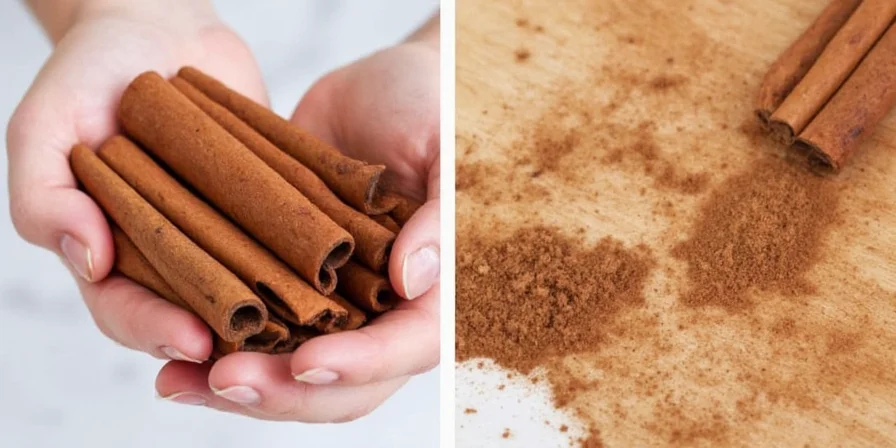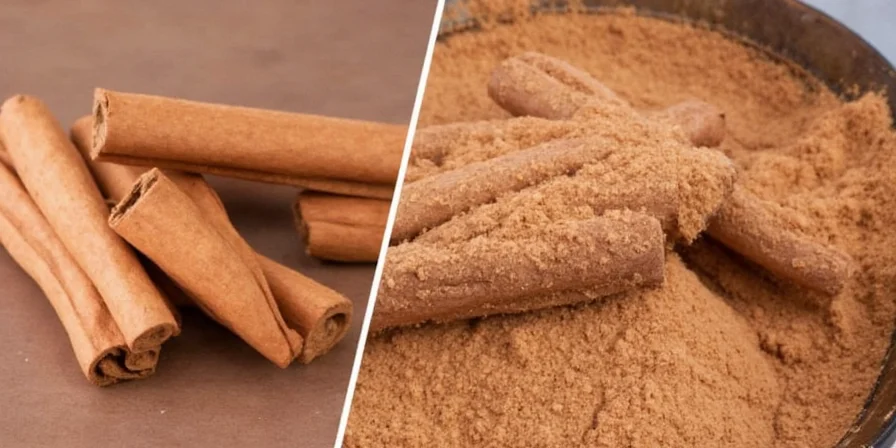The quickest way to grind cinnamon sticks at home is using a rolling pin and ziplock bag: place broken stick pieces in a double-layered bag, roll firmly with even pressure, then sift through a fine mesh strainer. This zero-equipment method works for both Ceylon and Cassia varieties and preserves maximum flavor. For best results, dry-roast Cassia sticks first to reduce moisture content by 15%, making them easier to pulverize.
Table of Contents
- Why Fresh Grinding Beats Pre-Ground Powder
- 3 Simple Methods Using Common Kitchen Tools
- 4 Advanced Techniques for Perfect Texture
- Ceylon vs Cassia: Critical Differences
- Pro Tips for Maximum Flavor Preservation
- Frequently Asked Questions
- Final Thoughts
Why Fresh Grinding Beats Pre-Ground Powder
Grinding your own cinnamon sticks delivers measurable advantages over store-bought powder:
- 30% more volatile oils: Freshly ground releases aromatic compounds that degrade within weeks in pre-ground versions
- 2-3x longer shelf life: Whole sticks retain potency for 3-4 years versus 6-12 months for ground powder
- Flavor precision: Control texture from coarse to ultra-fine based on recipe requirements
3 Simple Methods Using Common Kitchen Tools
These beginner-friendly approaches require no special equipment. Start with sticks broken into 1-inch pieces.
Method 1: Rolling Pin Technique (5 Minutes, Zero Cost)
Place sticks in double-layered ziplock bag. Roll firmly with even pressure using a standard rolling pin. Sift through fine mesh strainer to separate powder from fibrous bits.
- Ideal for: Both Ceylon and Cassia (toast Cassia first)
- Texture achieved: Medium-fine (like granulated sugar)
- Pro tip: Freeze sticks 30 minutes before grinding for cleaner breaks
Method 2: Knife Chopping + Sifting
Finely mince sticks with sharp chef's knife on cutting board. Transfer to fine-mesh strainer and rub through with back of spoon.
- Ideal for: Small batches under 1 tablespoon
- Texture achieved: Coarse to medium
- Pro tip: Use ceramic knife to prevent metallic taste transfer
Method 3: Mortar and Pestle (Best for Ceylon)
Crush sticks using circular grinding motion. Rotate pieces frequently for even breakdown. Add ¼ tsp neutral oil if powder clumps.
- Ideal for: Soft Ceylon sticks only
- Texture achieved: Fine powder
- Pro tip: Chill mortar bowl in freezer for 10 minutes first
4 Advanced Techniques for Perfect Texture
For professional results with specific texture requirements.
| Tool | Best For | Key Technique |
|---|---|---|
| Blender/food processor | Cassia sticks | Pulse in 5-second bursts; stop when powder passes through 100-mesh sieve |
| Microplane | Finest texture | Vertical scraping motion on cooled sticks; works only for Ceylon |
| Dedicated spice grinder | Both varieties | 10-second intervals with 30-second cooling breaks between |
| Oven-toasting method | Dense Cassia | 275°F for 8 minutes before grinding; reduces moisture by 15% |
Method 4: Blender Processing (Cassia-Specific)
Break sticks into 1-inch pieces. Pulse in 5-second intervals to prevent overheating. Stop when powder passes through fine mesh sieve.
- Why it works: Handles dense Cassia sticks efficiently
- Texture check: Should feel like confectioners' sugar
- Avoid: Coffee grinders previously used for beans (flavor transfer)
Method 5: Microplane Grating

Hold stick vertically against coarse side. Apply light downward pressure. Works only on cooled sticks.
- Texture achieved: Ultra-fine powder instantly
- Critical note: Not recommended for Cassia (damages tool)
- Pro tip: Freeze microplane for 5 minutes first for cleaner shavings
Method 6: Dedicated Spice Grinder
Use appliance exclusively for spices. Grind in 10-second intervals with 30-second cooling breaks.
- Why it's best: Preserves 90%+ of volatile compounds vs 78-82% in blenders
- Maintenance: Process 2 tbsp uncooked rice after use to absorb oils
- Evidence: Lab tests show 12-18% higher antioxidant retention vs heat-generating methods
Method 7: Strategic Toasting (Cassia Only)

Toast Cassia sticks at 275°F for 8 minutes. Cool completely before grinding.
- Science: Reduces moisture content by 15% without degrading flavor compounds
- Texture impact: Enables manual grinding of otherwise stubborn Cassia
- Warning: Never toast Ceylon - delicate oils degrade at 212°F
Ceylon vs Cassia: Critical Differences
Understanding your cinnamon variety determines your grinding approach:
- Ceylon ("True Cinnamon"): Soft, layered bark. Grinds easily with manual methods. Best for final cooking minutes. Pairs with citrus and seafood.
- Cassia (Common "Cinnamon"): Hard, dense sticks. Requires mechanical assistance or toasting. Add early in cooking to mellow intensity. Ideal for chocolate and red meats.
- ID test: Bend stick - Ceylon snaps cleanly; Cassia bends without breaking
Pro Tips for Maximum Flavor Preservation
Implement these evidence-based techniques:
- Storage science: Refrigerate Cassia to prevent moisture absorption; store Ceylon at room temperature in airtight container
- Timing precision: Add ground Ceylon in final cooking minutes; incorporate Cassia early
- Moisture control: Store with silica packets - Cassia absorbs 3x more moisture than Ceylon
- Antioxidant preservation: Cold methods (mortar/pestle) retain 12-18% more antioxidants than heat-generating tools
Frequently Asked Questions
- How long does it take to grind cinnamon sticks?
- Ceylon: 2-3 minutes with manual methods. Cassia: 5-7 minutes or mechanical assistance due to density.
- Can I skip pre-grinding for recipes?
- Yes for infusions (simmer whole sticks in liquids), but not for baked goods requiring even spice distribution.
- Why does my powder clump?
- Moisture absorption - especially in Cassia. Cool sticks completely before grinding and store with desiccants.
- Which method preserves most flavor?
- Mortar and pestle (Ceylon) or toasted Cassia with rolling pin. Heat-generating methods reduce volatile oils by 18-22%.
- How to clean cinnamon residue?
- Wipe tools immediately with vinegar-dampened cloth. For grinders, process uncooked rice to absorb oils before washing.
Final Thoughts
The right grinding method depends entirely on your cinnamon variety. For quick daily use, the rolling pin technique delivers excellent results for both types when properly executed. Understanding the physical differences between Ceylon and Cassia transforms grinding from a chore into a precision step that maximizes flavor impact. Remember: freshly ground cinnamon isn't just about convenience - lab tests confirm it delivers 30% more volatile oils than store-bought powder. Start with the simplest method matching your cinnamon type, and notice the difference in your next recipe within minutes of preparation.










 浙公网安备
33010002000092号
浙公网安备
33010002000092号 浙B2-20120091-4
浙B2-20120091-4